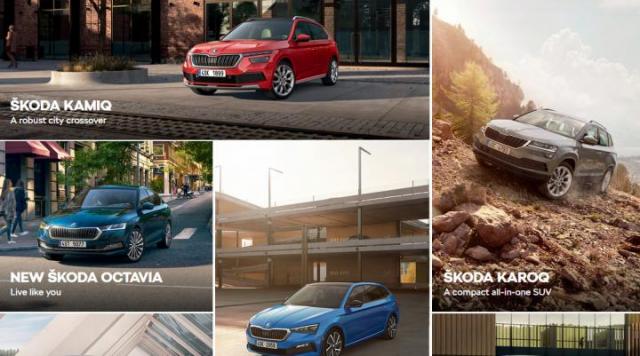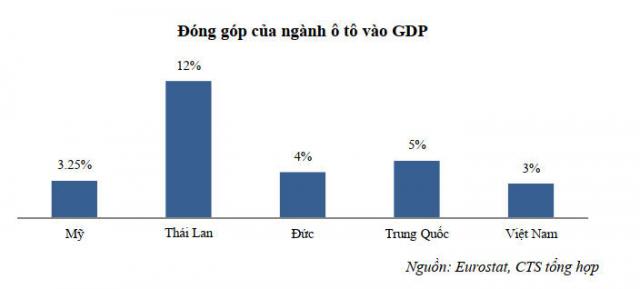VIETNAM AUTOMOBILE INDUSTRY: Golden Eggs For Whom?
NUMBERS TALK: Despite being affected by the Covid 19 pandemic, the Vietnamese car market in the first months of 2021 still outperformed 2020.
In the first quarter of 2021, the whole Vietnamese market sold 80,500 cars of all kinds, increasing by 164% compared to the same period in 2020 (the same period in 2020 only sold 50,009 cars).
As usual, Japanese and Korean automakers almost absolutely dominate the Vietnamese car market. Hyundai alone sold nearly 15,866 vehicles, accounting for a market share of 19.26%. However, the number of cars of Japanese automakers combined still accounts for the majority of the market. Only in the top 10, Japanese automakers sold a total of 37,564 vehicles, accounting for 45.53% of the market share. Meanwhile, Korean automakers sold 26,605 views, equivalent to 32.25% market share.
Thus, Japanese and Korean automakers alone accounted for 80% (77.78%) of Vietnam's car market, about 20% of which was divided among the remaining automakers.
Vinfast rose to 5th place with about 8.30% market share.
If adding April 2021, sales of domestically assembled cars increased by 46%, while imported cars increased by 78% over the same period in 2020.
If adding the number of cars sold by Vinfast and TC Motor (Manufacturing and distributing Hyundai cars in Vietnam), Vietnamese people have purchased up to 407,460 vehicles of all kinds (excluding imported luxury brands such as BMW). , Mercedes-Benz, Audi, Jaguar Land Rover, Volvo...
In the Top 10 list of giant brands, in addition to Vinfast and Thaco (truck lines) are Korean and Japanese brands. Leading the way are two brands that are very familiar to Vietnamese customers, Hyundai (81 thousand cars in 2020) and Toyota (nearly 71 thousand cars).
Sales of domestically produced and assembled vehicles skyrocketed when compared to the number of imported cars. The reason is a 50% discount on registration fees for domestically assembled cars.
However, this offer ended in December 2020 and experts, as well as domestic consumers, are predicting the number of cars imported in complete units, especially from Thailand and Indonesia (which are two exporting countries for cars. large into Vietnam) will increase rapidly.
Customs figures in the first months of 2021 have confirmed this trend.
The most noticeable change of the Vietnamese car market in 2020 is the mark when Korean car brands have made spectacular strides, surpassing Japanese automakers to become the best selling car brands in the world. best in Vietnam. Overcoming the difficulties of the epidemic in 2020, Korean automakers have now become an equal balance with traditional Japanese car empires in the Vietnamese market.
In fact, the Hyundai brand has gone further than Japanese automakers if we include the Hyundai cars assembled and distributed by TC Motor, all of which achieved impressive total sales of 81,368 vehicles, an increase of 1,800 vehicle compared to the previous year.
GOLDEN EGG CHICKEN FOR WHO?
The Vietnamese car market is not too big, but it is considered a "golden egg" for a small group of "big guys".
About the first big player, we must talk about Toyota Vietnam. Toyota Company is one of the earliest famous car manufacturers in Vietnam. In 1991, Toyota Motor Corporation of Japan (TMC) decided to invest in the Vietnamese market despite the difficulties in infrastructure, market size, limitations in investment policies... but there was attractiveness. The leader of a country with a young population, striving to innovate… After more than 4 years, in 1995, Toyota Motor Vietnam (TMV) was officially established and until August 1996, the The investment of nearly 15 million USD has brought about the first modest result, the number 1 car produced (assembled) in Vietnam - Toyota Hiace has been shipped. In this initial phase, Toyota Vietnam's output is only 2 cars/day.
Up to now, Toyota Vietnam has had more than 20 factories supplying spare parts, mainly suppliers of Toyota Corporation Japan participating in investing in Vietnam such as Toyota Boshoku, Toyoda Gosei...
Currently, Toyota Vietnam is still one of the leading companies in the automobile market in the country (in the last 2 years, Toyota Vietnam has been temporarily surpassed by Hyundai, South Korea). Each year, the company provides an output of over 30,000 vehicles per year, cumulative sales of over 305,799 units. Toyota Vietnam has brought jobs to more than 1,900 employees and more than 6,000 employees working at 41 agents/branches across the country.
Toyota Vietnam also actively participates and contributes a lot to practical and meaningful activities of the community and society. It can be affirmed that Toyota Vietnam is a typical example of daring, brave and persistent investment success in Vietnam. The car company has enjoyed worthy results with the journey of nearly 30 years of investment and contribution in Vietnam.
Not only Toyota Vietnam, Vietnam's automobile industry is considered as a golden egg laying hen for leading Japanese automakers since the 90s and then Korean auto groups for many decades. It can be affirmed that all Japanese and Korean car manufacturers have "recovered capital" very quickly for their investment projects. According to many auto industry experts, they have recovered their investment capital only for a period of 3-4 years and continue to collect golden eggs ever since.
CONSUMERS BELIEVE BILLIONS
Besides the great things Japanese and Korean automakers bring to Vietnam, there are also some realities that limit the development of the Vietnamese auto industry.
The first detail that many experts noticed is that Vietnamese companies are practically not involved in the value chain of the automobile manufacturing process. Simply put, car manufacturers mostly appoint direct suppliers from Japan, Korea and Vietnamese companies only participating as subcontractors, processing but a very small number of simple components in nearly 30,000 parts) of automobiles. The reason is because Vietnam does not have a legal corridor that requires "localization" in the true sense. This has contributed significantly to the fact that Vietnam's supporting industries cannot develop and are in the "clinical" stage despite being called for a lot of support and development.
One of the leading mechanical companies in Vietnam said that they have to invest 4 years, invest in finance to buy machines, train workers just to get processing contracts for 4 simple products for a car assembler in Vietnam with an output of 7,000 - 8,000 products per year. Not to mention, all embryos and materials the company must buy from the manufacturer's designated supplier.
In Vietnam, the car manufacturing process is mainly assembling available imported components. This fact has significantly affected the price of domestically produced cars. The import tax on auto parts into Vietnam is currently about 7 - 9%, the professional skills of the workforce are not improved and ultimately the burdens of consumers and end customers.
Currently, according to experts, the production cost of domestically assembled cars is about 10% - 20% higher than foreign ones, so the selling price is higher than imported cars. According to many forecasts, if there are no major changes, Vietnam's tourist car market will mainly be imported or assembled from the "old lines" of car manufacturers in the world.
Taxes and fees are weighing on Vietnamese consumers.
Importing into Vietnam and reaching consumers must carry at least 10 different official fees (not including surcharges, local fees, etc.) such as import tax, excise tax, VAT, tax corporate income and fees such as registration fee, license plate fee, registration fee, road maintenance fee, insurance fee.
The fact that Japanese and Korean automakers almost absolutely dominate the Vietnamese car market is also a disadvantage for consumers who do not have the opportunity to access other options. A lame comparison, a bit like the subsidy period when people only had a very limited opportunity to choose from a few items.
In addition to sensible reasons, business strategies, marketing and sales that are suitable for the Vietnamese environment, Japanese and Korean automakers also enjoy many "unwritten" incentives when participating in investment in Vietnam. Male. In addition, the reason for business culture and people is also a factor affecting the opportunity and decision to participate in the market of European and American car manufacturers in Vietnam.
Ha Linh
According to OFFICIAL STATISTICS OF VIETNAM AUTOMOBILE MANUFACTURERS' ASSOCIATION (VAMA) and the General Department of Customs, IN 2020, VIETNAMESE PEOPLE HAVE CONS TO BUY NEARLY 400,000 CARS. THIS NUMBER WILL BE BETTER IF TAKING TRANSFER, TRANSFER OF USE VEHICLES.
BY EXPERTS' ESTIMATE, TOTAL TAXES AND CHARGES FOR ONE IMPORTED VEHICLE (CYLINDER TYPES BELOW 2.0), CONSUMERS LOOK UP TO AT LEAST 90% OF THE VEHICLE VALUE. EXAMPLE VEHICLE 2.0 WITH A VALUE OF ABOUT 550 MILLION (IN NEARLY COUNTRIES) WHEN ARRIVING TO VIETNAM AND TO CONSUMERS WILL HAVE THE SAME TYPES OF TAXES AND CHARGES UP TO 500 MILLION CHARGES % FROM SOUTHEAST ASIA COUNTRIES).
- News digest: Border village left stranded as Danube rises
- Oldest canoe club in Bratislava celebrates centenary, then battles floods
- Culture minister blames former National Gallery director once again, this time for water leaks
- Minister Kamenický’s planned book VAT hike faces fierce backlash from all sides
- Slovak Matters: in praise of burčiak
- Weighing more than 5,000 elephants, this bridge is paratroopers and filmmakers’ favourite
- News digest: Buy books? Minister says you’re wealthy and should pay more for them
- News digest: Read books? Minister says you’re wealthy and should pay more for them
- Opposition leader Šimečka removed as deputy speaker, but remains unshaken
- “It’s a must”: How PM Fico plans to fix Slovakia’s public finances
- Slovak-Belgian team unearths extinct lizard in Europe—a species once known only from the US
- Bratislava floods stabilise as military shuttles deployed in Devín
- Bobaľky, pirohy, holubky: find these traditional Slovak dishes in this Slovak-American's cookbook
- News digest: While some sandbag, others watch and pray—guess which group the president joined?
- A political bomb that didn’t explode
- Archaeologists in Trenčín on the hunt for a secret room
- The Danube peaks Tuesday; Devín borough isolated by flooding
- Last Week: Attempt to oust Šimečka exposes coalition’s hypocrisy








